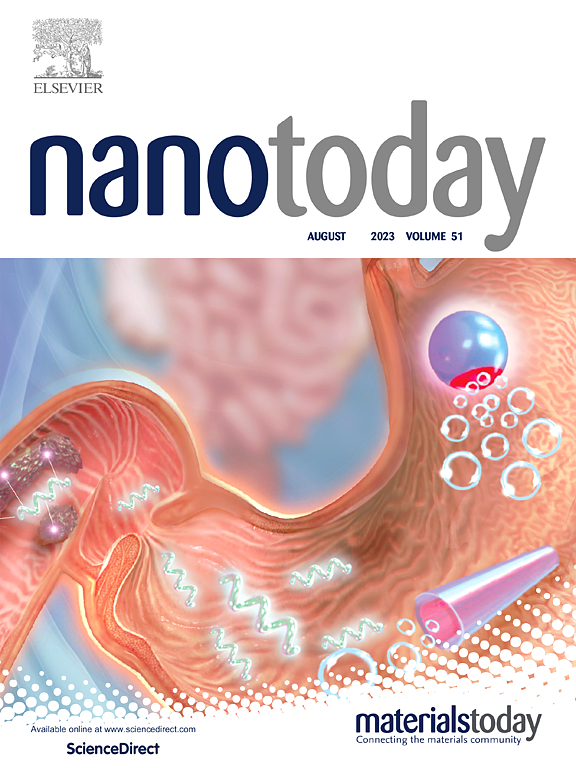纳米级先天免疫倍增器通过增强全身和训练免疫,放大奥沙利铂引发的免疫原性细胞死亡
IF 13.2
1区 材料科学
Q1 CHEMISTRY, MULTIDISCIPLINARY
引用次数: 0
摘要
诱导癌细胞免疫原性死亡(ICD)是细胞毒性药物提高与免疫治疗协同作用的关键。然而,由于免疫抑制微环境和药物细胞毒性的差异,ICD的作用往往不足,难以有效持久地激活抗肿瘤免疫反应。在此,我们基于胃肠道肿瘤的临床数据进行了网络荟萃分析(NMA),确定奥沙利铂(Oxp)是一种有效的icd诱导药物。同时,为了克服免疫抑制微环境对ICD的负面影响,我们构建了由纳米颗粒状唑来膦酸锰组成的纳米级先天免疫增效剂(NIIM),并设计了系统递送策略,实现了多位点先天免疫应答的叠加,放大了Oxp的ICD效应。NIIM首先针对肿瘤组织,在那里它同时作用于肿瘤细胞和先天免疫细胞来逆转免疫抑制微环境。经静脉给药后,NIIM也分布到脾脏,激活Ly6C+炎性单核细胞,直接增强对肿瘤细胞的吞噬和清除,并通过细胞毒性T细胞诱导肿瘤杀伤作用。此外,NIIM调节骨髓中造血祖细胞的组成,通过训练免疫诱导持久的先天免疫反应。这些免疫效应的叠加使得NIIM在单次注射后就能显著提高奥沙利铂治疗胃肠道癌症的疗效。综上所述,这种基于静脉注射NIIM同时激活肿瘤内、全身和训练免疫的策略为增强细胞毒性药物的ICD和实现化疗与免疫治疗的有效协同提供了一种有效的新途径。本文章由计算机程序翻译,如有差异,请以英文原文为准。
A nanoscale innate immune multiplier amplifies immunogenic cell death triggered by oxaliplatin via enhancing systemic and trained immunity
Inducing immunogenic cell death (ICD) of cancer cells is the key for cytotoxic drugs to improve the synergy with immunotherapy. However, due to the immunosuppressive microenvironment and the cytotoxicity differences of drugs, ICD effects are often insufficient and difficult to effectively and durably activate anti-tumor immune responses. Here, we performed a network meta-analysis (NMA) based on clinical data of gastrointestinal cancer and identified oxaliplatin (Oxp) as an effective ICD-inducing drug. Meanwhile, to overcome the negative effects of immunosuppressive microenvironment on ICD, we constructed a nanoscale innate immune multiplier (NIIM) composed of nano-granulated manganous zoledronate, and designed a systemic delivery strategy to achieve the superposition of innate immune responses from multiple sites and amplify the ICD effect of Oxp. NIIM was first targeted to the tumor tissue, where it concurrently engaged tumor cells and innate immunocytes to reverse the immunosuppressive microenvironment. Following intravenous administration, NIIM was also distributed to the spleen, where it activated Ly6C+ inflammatory monocytes, directly augmenting the phagocytosis and elimination of tumor cells, and inducing the tumor-killing efficacy by cytotoxic T cells. Additionally, NIIM modulated the composition of hematopoietic progenitor cells in the bone marrow, inducing a durable innate immune response through trained immunity. The superposition of these immune effects allowed NIIM to significantly enhance the efficacy of oxaliplatin in gastrointestinal cancers after only one single injection. In summary, this strategy of simultaneously activating intratumoral, systemic, and trained immunity based on intravenous NIIM provides an effective new approach to amplify ICD of cytotoxic drugs and achieve the efficient synergy of chemotherapy with immunotherapy.
求助全文
通过发布文献求助,成功后即可免费获取论文全文。
去求助
来源期刊

Nano Today
工程技术-材料科学:综合
CiteScore
21.50
自引率
3.40%
发文量
305
审稿时长
40 days
期刊介绍:
Nano Today is a journal dedicated to publishing influential and innovative work in the field of nanoscience and technology. It covers a wide range of subject areas including biomaterials, materials chemistry, materials science, chemistry, bioengineering, biochemistry, genetics and molecular biology, engineering, and nanotechnology. The journal considers articles that inform readers about the latest research, breakthroughs, and topical issues in these fields. It provides comprehensive coverage through a mixture of peer-reviewed articles, research news, and information on key developments. Nano Today is abstracted and indexed in Science Citation Index, Ei Compendex, Embase, Scopus, and INSPEC.
 求助内容:
求助内容: 应助结果提醒方式:
应助结果提醒方式:


